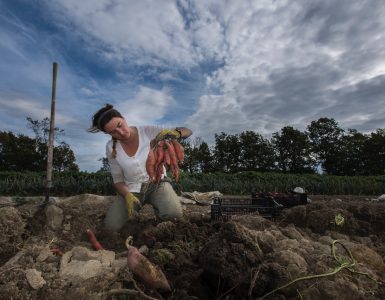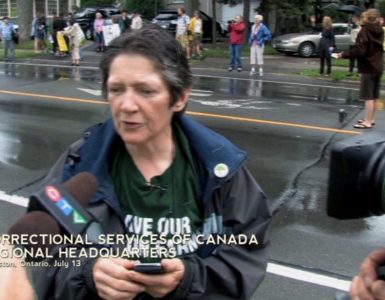The national movement for a Basic Income Guarantee is gaining ground. The heart of the Basic Income Guarantee (BIG) is a government program that would ensure every person in Canada a certain amount of income every year to “to meet basic needs and live with dignity.” And this could have big implications for food and farming.
Dr. Elaine Power, an author and professor at Queen’s University, is excited about BIG’s momentum. “To me it feels like we’ve reached Gladwell’s proverbial tipping point,” she says. “It’s taken off like wildfire. A bit of effort, a lot of results.”
In December of 2015, Kingston City Council passed a unanimous resolution endorsing the Basic Income Guarantee and calling on other cities to do the same. Kingston was the first, and a series of Ontario municipalities have followed suit, including Belleville, Cornwall, Peterborough, and Welland.
The initiative has also seen growing support across Canada and across the political spectrum. Conservative former senator Hugh Segal is a vocal backer of BIG. Mayors from Edmonton to Calgary to Iqaluit have all thrown their weight behind it. During Prince Edward Island’s recent provincial election, the leaders of all major parties endorsed BIG, and PEI’s premier has vowed to promote it.
“Certainly for low income folks who don’t have enough money to eat, a BIG would ensure that everyone has adequate money to buy the food they need for their health,” explains Dr. Power. “It improves dignity. It allows people to be socially included. To do things that are more normal. To go to farmers’ markets, not food banks.”
For this reason, a Basic Income Guarantee is gaining wide support among food organizations such as Food Banks Canada, Community Food Centres Canada, and Food Secure Canada, as well as the Canadian Medical Association and the Ontario Public Health Association.
“In my mind, a successful BIG would mean closing all the food banks,” says Dr. Power. “And would probably save about 20 per cent of our healthcare budget.”
Poverty is a enormous drain on Canada’s health expenditures because people without enough healthy food get sick more often and stay sick longer.
“We don’t like to think that people are malnourished in this country, but they are,” says Dr. Power. “People can’t get enough fruit and vegetables, even protein. People are living on cheap carbs, things that are filling, not things that are healthy.”
BIG has special appeal for farmers and local economies. Dr. Power explains: “Low income people spend money in the local economy. They don’t put it in Swiss bank accounts, they spend it on essentials like food.
“It would provide a huge impetus for local economies.” As an example, Dr. Power points out that “research in the US on food stamps shows that every dollar spent on food stamps generates $1.80 in local activity.”
Farmers would also benefit greatly from a Basic Income Guarantee. The benefits for rural economies are clear. But a BIG could also stabilize income for farmers in the face of uncertainty, from fluctuating global grain prices to weather variation and climate change.
A BIG would also benefit farmers at either end of the age spectrum. The majority of farmers in Canada are close to retirement age, and while food production is an important public service, few farmers have pensions like those retiring from government employment.
Basic Income Guarantee could also encourage young farmers, who face substantial barriers – a major reason for the ageing farmer population. It would also be good for farm workers; right now, the challenges of seasonal employment can make it difficult to train and retain experienced workers on farms.
And a Basic Income Guarantee could also make it easier to farm sustainably and take care of the land. The stability it would offer could help farmers to make better long-term stewardship choices for the benefit of soil, water, and biodiversity.
Dr. Power hopes this could apply to all of society. “A BIG could remove fear and restore a sense of security. So that we can think more clearly about the future and the kind of planet we want.” And she is optimistic that those in the future will one day see BIG as a core part of our society.
“One of our hopes is that it will be our 21st century Medicare. A social program we can’t imagine living without.”
More information can be found at www.basicincomecanada.org.
Aric McBay is a farmer and author. He lives and works at a mixed family farm with a dairy herd and a Community Shared Agriculture (CSA) vegetable operation.







